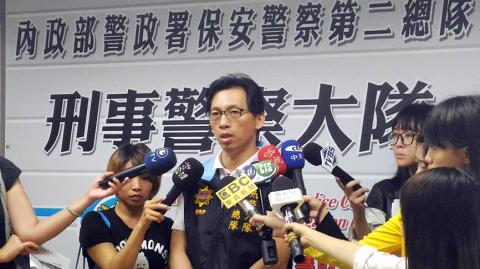Judicial authorities yesterday said that they have charged five men who allegedly stole intellectual property from a Tainan nanotechnology company and set up competing nanotechnology plants in China with breaching the Trade Secrets Act (營業秘密法).
The Second Special Police Corp, under the National Police Agency, announced details of the investigation yesterday, saying it is the first investigation and prosecution under the act since it was implemented in 2013.
Police said that they detained three former Hsin Fang Nano Technology Co (新芳奈米科技) employees, including a former plant manager surnamed Chen (陳) and a production section chief surnamed Yu (尤), along with two other business associates.

Photo: Huang Chien-hua, Taipei Times
“The estimated financial loss to our company is about NT$2.6 billion [US$81.08 million]. We urge the government to crack down on intellectual property theft against Taiwanese businesses,” chairman Chang Jen-hung (張仁鴻) said.
Hsin Fang is a grinding mill machine manufacturer, which are used to produce ultra-fine nanopowders for use in pharmaceuticals, cosmetics, consumer electronics, health food, anti-radiation coating, military weapons and in other industrial applications.
Company officials said their nanopowder grinding mill, which incorporates an innovative “dry cryo-nanonization grinding system,” received a top award at a nanotechnology exhibition in Tokyo in 2012, and honors at other industry fairs in Taiwan and other countries.
The investigation in 2014 followed reports that Chen, Yu and other former employees, backed by business associates, started a new company in Yunlin County — Unicat Nano Advanced Materials & Devices Technology Co (環美凱特).
Unicat Nano later moved to Chongqing, China, setting up nanotechnology businesses that, according to investigators, were based on intellectual property stolen from Hsin Fang by Chen, Yu and other former employees.
The Public Security Police Brigade investigation unit last year launched raids to gather evidence at offices, company plants and residences in Yunlin, Tainan and New Taipei City, where they took in suspects for questioning and confiscated computers, files and powder mill machines.
Although the former Hsin Fang employees denied the accusations, prosecutors said they have gathered sufficient evidence and announced the charges against the suspects.
Chang said Hsin Fang’s 15 years of investment in research and development has been wasted because of the theft.
“The government must do something about it, because intellectual property theft will do grave damage to Taiwan’s technology industries,” he said.

A magnitude 7.0 earthquake struck off Yilan at 11:05pm yesterday, the Central Weather Administration (CWA) said. The epicenter was located at sea, about 32.3km east of Yilan County Hall, at a depth of 72.8km, CWA data showed There were no immediate reports of damage. The intensity of the quake, which gauges the actual effect of a seismic event, measured 4 in Yilan County area on Taiwan’s seven-tier intensity scale, the data showed. It measured 4 in other parts of eastern, northern and central Taiwan as well as Tainan, and 3 in Kaohsiung and Pingtung County, and 2 in Lienchiang and Penghu counties and 1

FOREIGN INTERFERENCE: Beijing would likely intensify public opinion warfare in next year’s local elections to prevent Lai from getting re-elected, the ‘Yomiuri Shimbun’ said Internal documents from a Chinese artificial intelligence (AI) company indicated that China has been using the technology to intervene in foreign elections, including propaganda targeting Taiwan’s local elections next year and presidential elections in 2028, a Japanese newspaper reported yesterday. The Institute of National Security of Vanderbilt University obtained nearly 400 pages of documents from GoLaxy, a company with ties to the Chinese government, and found evidence that it had apparently deployed sophisticated, AI-driven propaganda campaigns in Hong Kong and Taiwan to shape public opinion, the Yomiuri Shimbun reported. GoLaxy provides insights, situation analysis and public opinion-shaping technology by conducting network surveillance

Taiwan is gearing up to celebrate the New Year at events across the country, headlined by the annual countdown and Taipei 101 fireworks display at midnight. Many of the events are to be livesteamed online. See below for lineups and links: Taipei Taipei’s New Year’s Party 2026 is to begin at 7pm and run until 1am, with the theme “Sailing to the Future.” South Korean girl group KARA is headlining the concert at Taipei City Hall Plaza, with additional performances by Amber An (安心亞), Nick Chou (周湯豪), hip-hop trio Nine One One (玖壹壹), Bii (畢書盡), girl group Genblue (幻藍小熊) and more. The festivities are to

AFTERMATH: The Taipei City Government said it received 39 minor incident reports including gas leaks, water leaks and outages, and a damaged traffic signal A magnitude 7.0 earthquake struck off Taiwan’s northeastern coast late on Saturday, producing only two major aftershocks as of yesterday noon, the Central Weather Administration (CWA) said. The limited aftershocks contrast with last year’s major earthquake in Hualien County, as Saturday’s earthquake occurred at a greater depth in a subduction zone. Saturday’s earthquake struck at 11:05pm, with its hypocenter about 32.3km east of Yilan County Hall, at a depth of 72.8km. Shaking was felt in 17 administrative regions north of Tainan and in eastern Taiwan, reaching intensity level 4 on Taiwan’s seven-tier seismic scale, the CWA said. In Hualien, the